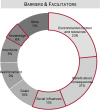Barriers and facilitators to changing bowel care practices after spinal cord injury: a Theoretical Domains Framework approach
- PMID: 34997189
- PMCID: PMC9287175
- DOI: 10.1038/s41393-021-00743-0
Barriers and facilitators to changing bowel care practices after spinal cord injury: a Theoretical Domains Framework approach
Abstract
Background: Improvement to autonomic processes such as bladder, bowel and sexual function are prioritised by individuals with spinal cord injury (SCI). Bowel care is associated with high levels of dissatisfaction and decreased quality of life. Despite dissatisfaction, 71% of individuals have not changed their bowel care routine for at least 5 years, highlighting a disconnect between dissatisfaction with bowel care and changing routines to optimise bowel care.
Objective: Using an integrated knowledge translation approach, we aimed to explore the barriers and facilitators to making changes to bowel care in individuals with SCI.
Methods: Our approach was guided by the Behaviour Change Wheel and used the Theoretical Domains Framework (TDF). Semi-structured interviews were conducted with individuals with SCI (n = 13, mean age 48.6 ± 13.1 years) and transcribed verbatim (duration 31.9 ± 7.1 min). Barriers and facilitators were extracted, deductively coded using TDF domains and inductively analysed for themes within domains.
Results: Changing bowel care after SCI was heavily influenced by four TDF domains: environmental context and resources (workplace flexibility, opportunity or circumstance, and access to resources); beliefs about consequences; social influences (perceived support and peer mentorship); and knowledge (knowledge of physiological processes and bowel care options). All intervention functions and policy categories were considered viable intervention options, with human (61%) and digital (33%) platforms preferred.
Conclusions: Modifying bowel care is a multi-factorial behaviour. These findings will support the systematic development and implementation of future interventions to both enable individuals with SCI to change their bowel care and to facilitate the optimisation of bowel care approaches.
© 2022. The Author(s).
Conflict of interest statement
The authors declare no competing interests.
Figures




Similar articles
-
Exploring smoking cessation experiences among persons with spinal cord injury: Informing theory-based recommendations for interventions.Spinal Cord. 2023 Jan;61(1):27-36. doi: 10.1038/s41393-022-00856-0. Epub 2022 Sep 22. Spinal Cord. 2023. PMID: 36138096
-
Barriers and facilitators to the implementation of a school-based physical activity policy in Canada: application of the theoretical domains framework.BMC Public Health. 2017 Oct 23;17(1):835. doi: 10.1186/s12889-017-4846-y. BMC Public Health. 2017. PMID: 29061140 Free PMC article.
-
Enhancing participation while aging with spinal cord injury: applying behaviour change frameworks to develop intervention recommendations.Spinal Cord. 2021 Jun;59(6):665-674. doi: 10.1038/s41393-020-00555-8. Epub 2020 Sep 28. Spinal Cord. 2021. PMID: 32989252
-
Barriers and facilitators to clinical behaviour change by primary care practitioners: a theory-informed systematic review of reviews using the Theoretical Domains Framework and Behaviour Change Wheel.Syst Rev. 2022 Aug 30;11(1):180. doi: 10.1186/s13643-022-02030-2. Syst Rev. 2022. PMID: 36042457 Free PMC article.
-
Facilitators and barriers to the delivery of eye care by optometrists: a systematic review using the theoretical domains framework.Ophthalmic Physiol Opt. 2021 Jul;41(4):782-797. doi: 10.1111/opo.12801. Epub 2021 Mar 28. Ophthalmic Physiol Opt. 2021. PMID: 33774856
Cited by
-
A data extraction template for the behaviour change intervention ontology.Wellcome Open Res. 2024 Mar 26;9:168. doi: 10.12688/wellcomeopenres.20872.1. eCollection 2024. Wellcome Open Res. 2024. PMID: 38873399 Free PMC article.
-
Bowel and Bladder Dysfunction after SCI: A Comparison between India and Canada.Top Spinal Cord Inj Rehabil. 2024 Summer;30(3):1-9. doi: 10.46292/sci23-00058. Epub 2024 Aug 8. Top Spinal Cord Inj Rehabil. 2024. PMID: 39139774 Free PMC article.
-
Bowel burdens: a systematic review and meta-analysis examining the relationships between bowel dysfunction and quality of life after spinal cord injury.Spinal Cord. 2024 Sep;62(9):495-506. doi: 10.1038/s41393-024-01002-8. Epub 2024 Jul 16. Spinal Cord. 2024. PMID: 39014196 Free PMC article.
-
Facilitators and barriers in the rehabilitation process described by persons with spinal cord injury: a deductive-inductive analysis from the Finnish spinal cord injury study.Ann Med. 2023;55(2):2303398. doi: 10.1080/07853890.2024.2303398. Epub 2024 Jan 17. Ann Med. 2023. PMID: 38232950 Free PMC article.
References
-
- Martin Ginis KA, van der Scheer JW, Latimer-Cheung AE, Barrow A, Bourne C, Carruthers P, et al. Evidence-based scientific exercise guidelines for adults with spinal cord injury: an update and a new guideline. Spinal Cord. 2018;56:308–21. - PubMed
MeSH terms
LinkOut - more resources
Full Text Sources
Medical

